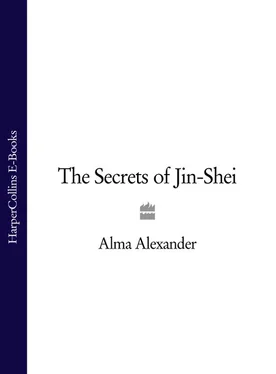The delivery cart was equipped with a small bell, and at its summons a household servant usually emerged from a side door at any given household to pick up the clean laundry, deliver the next batch of dirty laundry, and hand over Li’s fee, which Nhia slipped into a waist pouch which she wore underneath her tunic. There were only five deliveries to be made that afternoon but Nhia could feel the sun sucking the energy out of her as she pedalled through the dusty streets, could feel rivulets of sweat snaking down along her spine and beading her forehead. Her hair felt damp and plastered down; her straw hat’s snug presence on her head felt like a vice around her temples before she had gone halfway along her route. She passed a sherbet seller who had grabbed a shady spot underneath a courtyard archway and was loudly hawking his cool drinks, but she had spent all her spare coins at the Temple that morning and it was more than her life was worth to hazard any of Li’s hard-earned fee money on such indulgences. A sherbet paid for in the coin of Li’s acid accusations of profligacy on Nhia’s return home was entirely too expensive for Nhia to contemplate. So she just allowed her mind to cool itself on the thought of the sherbet and pedalled on, resigned, to fulfil her chores.
The household of Cheleh, the Court Chronicler, was the last stop on her list. The Chronicler lived in a brick pagoda house of two storeys with a bright red tile roof. It was surrounded by a low wall, with the hacha-ashu symbols for prosperity and happiness – common symbols even those unlearned in the script could recognize – painted on the pillars of the gateway which led through it into the Chronicler’s leafy yard, shaded by a number of magnolia trees. The temperature dropped perceptibly as Nhia drove her cart through this archway and around to the back of the house, riding in the shade of the trees. There even seemed to be a breath of wind here. She paused for a moment, breathing deeply, taking the time to remove her hat and mop her forehead and temples with her sleeve, feeling reprieved enough to look up at the leafy canopy curled protectively around her, between her and the implacable sun, and smile.
Impatient at the sedan chair bearer’s pace, hot and stifled in the curtained enclosure she shared with her mother and docile younger sister, Khailin’s mood was dangerously volatile as the chair approached home. The Temple trip had been augmented by a brief and unscheduled stopover at the hated ritual baths, which had done little to improve Khailin’s disposition, and the long, hot, stuffy trip home had only served to bring her temper from what had been a low simmer up to a definite readiness to boil explosively at the least provocation. Her skin felt greasy from the oils and balms from the bath, her pores clogged and unable to breathe, her clothes sliding unpleasantly on skin slick from sweat and ointment. Apparently unconcerned with such physical discomforts, Yulinh was dozing, reclined into the cushions in the back of the chair; Yan was sitting gracelessly with her legs crossed in an indecorous manner, playing with a couple of puppets in her lap. Yan was entirely too much like a puppet herself, Khailin thought with a savage little frown. She did what whoever was pulling her strings wanted done; she was the perfect child, obedient, respectful, and completely lacking in any initiative or curiosity.
Khailin had peered out of the sedan chair’s curtains just as the bearers had started to turn into the courtyard, and caught a glimpse of the painted symbol on the left-hand pillar of the gate. Happiness. Indeed. Her current rather sour mood saw that sign only as a vague mockery today.
She caught a glimpse of a figure on a pedal cart moving slowly away under the trees at the back of the courtyard, and her eyes narrowed a little at the sight of the cart’s occupant. For a moment it could have been anybody, any one of a thousand thin Linh-an waifs, clad in homespun, features shaded by a huge straw hat. But even as the sedan turned and started to bear Khailin out of sight of the cart and the figure on it, even as she clutched at the sedan chair’s curtains and peered intently at the disappearing cart, the girl on it fumbled under her chin and lifted off her hat, raising her face to the trees, giving Khailin one brief but adequate glimpse of the features she had committed to memory earlier that day at the Temple.
Could it really be this easy?
The little ugly God in the Second Circle was going to have a good fat offering the next time Khailin found herself at the Temple, if indeed this was the same child who had spoken with the Sage Lihui. Khailin scrabbled out of the chair almost before the bearers set it down, drawing a lazy reproof from her somnolent mother.
‘Khailin, when are you going to learn that a lady –’
‘I’m sorry, Mother,’ Khailin said in swift, automatic and thoroughly meaningless apology, and raced into the house.
The thick walls of the pagoda made the air inside soothingly cool after the hot streets, but Khailin didn’t stop to enjoy the change. She skidded around the entrance hall and past the curved staircase leading up to the second floor, and through the door under the stairs, carefully painted to make it practically invisible in the wall, into the back hallway and the servants’ quarters. A woman bearing a tray with delicate porcelain cups on it danced out of Khailin’s way, whisking the tray aside before Khailin smashed into it. A half-closed door further along the corridor stood ajar, giving Khailin a glimpse of a noisy, crowded kitchen. She nearly ran down another servant, this one bearing a neat bundle of laundry in a white linen bag. At the end of the corridor, a lacquered red door led outside – the back door for deliveries and for the servants’ quarters, the door which opened out into the back courtyard. Khailin flung it open, but emerged with a degree of calculated, stately slowness, not wanting to erupt outside looking like she was chasing demons. She was in time to see the back of the cart bouncing away around the corner of the house, with the girl, now wearing her hat again, bent over the steering bar. Seeing just the narrow childish back topped by that gigantic hat like some sort of exotic mushroom …; it was hard to be certain …; but a sure instinct of recognition made Khailin smile to herself.
It was a simple matter after that to find out who the girl was and what she was doing at Cheleh’s house. Less than four hours had passed since Khailin had first set eyes on her in the Temple.
She made a mental note to find out just who the little ugly deity was.
‘We are here because of jin-shei ,’ Rimshi said to Tai as they sat up late, talking, on the night that Antian’s gift and invitation had arrived from the Little Empress.
‘I know,’ Tai said, reaching with delight for one of her favourite fairy tales, the one that had been lived, had been real. ‘You were jin-shei-bao to one of the concubines, and she made the rest of them come to you for their Court gowns …;’ Tai had heard the story many times before but never tired of hearing about it – the story of Xien, her mother’s friend and jin-shei sister, the only child of a poverty-stricken family from the warrens of Linh-an whose bewitching dark green eyes and lotus-blossom skin Rimshi had been instrumental in bringing to the notice of the Imperial agents, and who had been raised to the Imperial Court to be the Emperor’s own love. Xien had never borne the Emperor any children, but she had been a beloved companion for years before a wasting disease took her when she was far too young. The Emperor had mourned her, and the Court had missed her; but by the time she was gone Rimshi, the companion of Xien’s childhood and her jin-shei-bao , was an essential without whose lavish and meticulous adornments on their garb the ladies of the Court felt incomplete and underdressed.
Читать дальше






![Theresa Cheung - The Dream Dictionary from A to Z [Revised edition] - The Ultimate A–Z to Interpret the Secrets of Your Dreams](/books/692092/theresa-cheung-the-dream-dictionary-from-a-to-z-r-thumb.webp)





